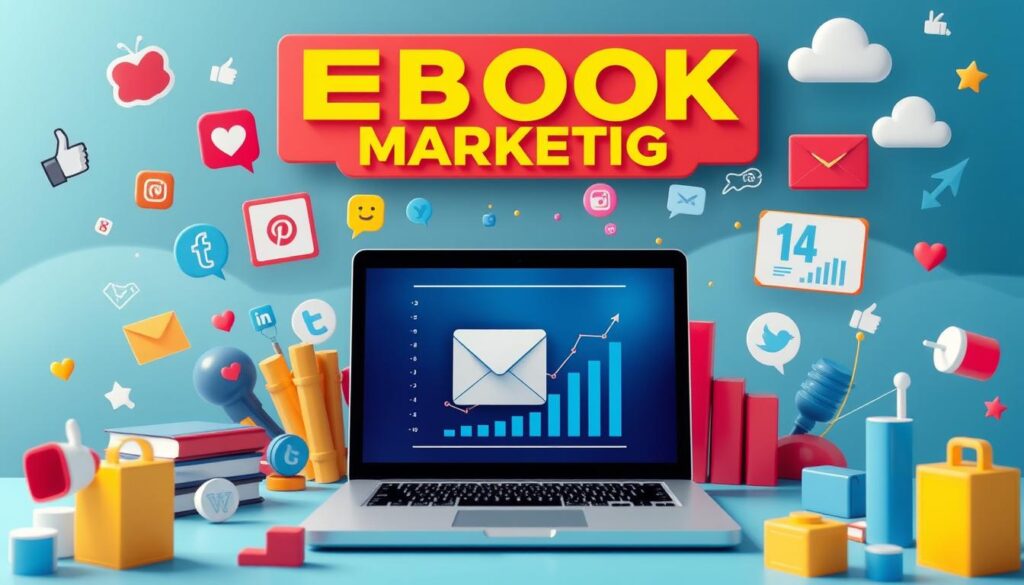“Technology is best when it brings people together.” – Matt Mullenweg. This quote is especially relevant today, with tools like ChatGPT changing how we write. As AI grows, more authors are using AI tools to help write eBooks. But can ChatGPT really replace the human touch in storytelling? This article explores ChatGPT’s role in eBook writing, from starting ideas to final edits.
The use of eBooks as marketing tools is on the rise, showing their power in drawing in customers. With eBook prices dropping from $50 to $3, this method is now more affordable for businesses12. eBooks can cover many topics, from education to entertainment, attracting a wide range of readers1. This makes it key to know your audience well, an area where ChatGPT excels, helping authors with ideas and content. ChatGPT is becoming a vital tool for ebook writing, changing how authors work.
Key Takeaways
- ChatGPT offers significant assistance in generating ideas and drafting content for eBooks.
- eBooks serve as an effective lead generation tool for businesses seeking to engage potential clients.
- Catering to various subjects enhances audience appeal and drives reader engagement.
- Utilizing AI tools like ChatGPT can streamline the eBook writing process, saving time and resources.
- Understanding target audience preferences is crucial for effective eBook content creation.
Introduction to eBooks and ChatGPT
EBooks have revolutionized how we share and consume information, making knowledge more accessible. They offer significant benefits to authors, capturing readers’ attention with their affordability and ease of access. The digital publishing era has transformed this landscape, providing numerous platforms for authors to showcase their expertise.
Understanding eBooks
EBooks cater to a wide range of readers, covering genres like Business, Health, and Self-help. Authors can earn royalties through platforms like Amazon’s KDP, making eBooks a viable source of income3. Strategies such as offering free copies and participating in Kindle Unlimited can increase visibility and reach3. Chatbot ebook creation helps authors refine their content, making it more engaging and relevant.
Evolution of eBooks in Digital Publishing
The digital publishing world has seen significant growth, opening up new avenues for eBook creation and distribution. Today’s writers benefit from advanced tools like ChatGPT, which streamlines their writing process. These tools help authors create compelling outlines, titles, and chapter content, ensuring high-quality engagement with their audience4. Despite these advancements, the importance of editing and proofreading remains paramount, enhancing the reader’s experience.
AI tools have further enriched the eBook landscape, enabling authors to explore new creative paths while staying current with digital publishing trends. The future of eBook creation looks promising, with innovative approaches set to empower both new and established writers34.
What is ChatGPT?

ChatGPT marks a significant leap in AI language models, aiming to streamline text generation. OpenAI developed this technology in 2019. It has since become one of the world’s largest and most advanced language models. ChatGPT employs advanced machine learning, especially natural language processing (NLP), to create coherent text based on user input. This makes it a crucial tool for various tasks, including eBook and article creation.
Overview of AI Language Models
AI language models, such as ChatGPT, have evolved significantly. They’ve moved from simple rule-based systems to sophisticated models that mimic human writing. ChatGPT offers two main versions: ChatGPT 3.5 and ChatGPT 4. Both are trained on vast datasets, enabling them to grasp human language complexities and respond accurately. This efficiency in content generation is a significant advantage, especially when considering the time and resources saved.
ChatGPT’s Capabilities and Limitations
ChatGPT excels in eBook creation, making the process faster and more accessible than traditional methods. It can produce an eBook in just 10 minutes5. The platform also helps in organizing content effectively6. However, it has limitations, including potential inaccuracies and a lack of emotional depth. While it can improve the editing process, it cannot replace human creativity and insight. Therefore, human oversight is crucial for ensuring the quality and accuracy of the content7.
How ChatGPT Can Assist in Writing an eBook
ChatGPT is a valuable resource for authors looking to write an eBook. It aids in various stages of the writing process. From generating content to brainstorming ideas and providing research support, it’s perfect for those seeking ChatGPT eBook assistance.
Content Generation
ChatGPT is a quick solution for writer’s block, enabling authors to draft entire eBook sections rapidly. For instance, it can complete a 20-page eBook in about three hours8. Authors can guide ChatGPT by refining prompts and explaining their goals. This ensures the content meets their exact vision.
Idea Brainstorming
As an idea generation AI, ChatGPT is exceptional at brainstorming concepts specific to an author’s niche. It provides structured prompts for genres like self-help, business, or travel. This helps authors focus on popular topics, such as children’s stories and cooking3.
Research Support
ChatGPT also excels in research support, guiding authors to relevant information and strategies. It suggests actionable steps to guide readers from point A to point B. This makes crafting message-driven content easier, enhancing the supporting content creation journey8.
Steps to Write an eBook with ChatGPT

Creating an eBook with ChatGPT requires a structured approach. First, clearly define the eBook’s purpose and identify the target audience. This foundational step is crucial for effective communication and reader engagement.
Defining the eBook’s Purpose
The first step in structuring your eBook is to articulate its objectives. Whether it’s to educate, entertain, or provide solutions, ChatGPT can help craft a precise purpose statement. Understanding the audience’s needs allows authors to tailor their messages, making the content more impactful.
Structuring the Content
After defining the purpose, organize your thoughts into a coherent framework. Create an outline that maps out major topics and subtopics. ChatGPT can help translate these outline points into detailed sections efficiently. Techniques like the Sprint Method can be beneficial, promoting focused writing sessions that yield around 1000 words per chapter in a 15-20k word eBook9. This structured approach enhances clarity and contributes to a more engaging narrative.
Drafting the Chapters
The AI drafting process is where the magic happens. ChatGPT can generate substantial content based on your outline, allowing you to refine your ideas dynamically. By responding to specific prompts, you can align the content with your tone and style9. Regular feedback and prompt alterations to ChatGPT are essential for quality content. This results in a polished and relevant eBook. The experience of using ChatGPT fosters rapid content development8 and encourages an effective writing environment.
Benefits of Using ChatGPT for eBook Writing
ChatGPT brings significant advantages to eBook writing, revolutionizing the author’s workflow. It offers a major time-saving benefit. Authors can use AI tools to generate content swiftly, saving countless hours of manual writing. This efficiency allows for time-saving eBook creation, enabling writers to refine their ideas and narratives while AI handles the routine tasks10.
Time Efficiency
ChatGPT excels in rapid content production, helping authors maintain a consistent writing pace. It assists in generating text ideas, suggesting plot points, and aiding in character development. This streamlines the creative process, boosting overall productivity11.
Cost-Effectiveness
From a financial standpoint, AI offers cost-effective writing solutions. Authors can reduce expenses by using ChatGPT for initial drafts and editing support. This approach not only lowers costs but also minimizes the need for extensive revisions12.
Enhanced Creativity
Another key benefit is the enhancement of creativity. AI tools like ChatGPT introduce unique perspectives, offering fresh ideas and alternative viewpoints. This creative input enriches the ideation process, allowing writers to explore new concepts and directions for their eBooks10.
Potential Challenges When Using ChatGPT

Integrating ChatGPT into writing comes with unique hurdles for authors aiming to enhance their creative output. A major concern is keeping the writing original. ChatGPT can generate content, but often it’s generic, which can dilute a unique voice1314. Authors must sift through AI-generated text to avoid blending in with others.
Maintaining Originality
Creating original content is key to effective writing. It ensures the material reflects the author’s style and adds value to the eBook. The challenge is to craft responses that inform and engage, while also showing a personal touch.
Addressing Inaccuracies
ChatGPT’s limited knowledge base, only up to 2021, can lead to outdated or incorrect information15. Writers must fact-check to correct any errors, highlighting the need for human oversight.
Avoiding Generic Content
ChatGPT can produce generic content, which can lessen the narrative’s depth. This highlights the need for authorial input in editing and refining14. To produce engaging eBooks, writers must carefully edit AI-generated material to match their vision and maintain creativity.
Ideal Use Cases for ChatGPT in eBook Creation

ChatGPT is versatile in various eBook formats. Authors can use AI for *fiction writing*, ensuring creativity and compelling narratives.
Fiction Writing
In fiction, ChatGPT aids in creating engaging plot ideas, character arcs, and realistic dialogue. This AI-driven method enhances storytelling and accelerates the creation process. It’s invaluable for writers exploring different genres.
Non-Fiction Guides
Authors in non-fiction benefit from AI’s structured content generation. It organizes complex subjects into digestible formats. ChatGPT enables authors to create comprehensive guides that meet audience needs, ensuring content is informative and engaging.
This aligns with the demand for authoritative voices in self-help and personal finance, popular eBook genres16. The ideal non-fiction eBook length ranges from 10,000 to 50,000 words, efficiently curated with AI tools16.
Educational Materials
In educational eBook creation, ChatGPT simplifies complex concepts and tailors content for diverse learners. This adaptability is key in today’s fast-changing educational landscape. It boosts learner engagement and knowledge retention.
By organizing eBooks into structured sections, including introductions and body chapters, ChatGPT helps educators create effective learning materials17.
Tailoring the Writing Style with ChatGPT

Customizing writing style is key for authors aiming to connect with their audience. ChatGPT provides features for tone adjustments in AI writing, helping users fine-tune their messages. It excels in creating content for various needs, including social media and eBooks, boosting productivity and idea generation18. Authors often rely on this tool for its ability to adapt to different styles and genres19.
Adjusting Tone and Voice
Personalizing ChatGPT content is greatly enhanced by its tone and voice adjustment capabilities. By setting specific guidelines, authors can craft text that accurately reflects their intentions. This ensures the narrative feels genuine, keeping readers engaged by aligning with their preferences.
Incorporating Personal Insights
While AI is powerful, personal insights are essential. ChatGPT can generate coherent drafts, but the human touch is needed for depth and emotional connection. Combining AI-generated writing with unique experiences creates a more compelling narrative. Writers should aim to infuse their essence into the content, strengthening the bond with their audience.
Integrating Feedback and Revisions

In eBook creation, feedback and revisions are key to a polished final product. Authors must review their work regularly to ensure clarity, coherence, and relevance. Feedback goes beyond just correcting errors; it enhances content quality. Seeking input from beta readers or professional editors is highly advised, offering fresh perspectives and crucial insights for revisions20. Using tools like ChatGPT for editing can save time, allowing authors to focus on creativity rather than tedious edits21.
Importance of Review Cycles
Review cycles are essential for refining eBook content. Each cycle brings new insights, highlighting areas needing adjustment. Authors must carefully review AI-generated material to ensure it matches their voice and audience expectations. The success of each cycle depends on addressing clarity and coherence, crucial for engaging readers. By revisiting drafts and ensuring high standards, authors can enhance the narrative’s impact.
Collaborating with Editors
Collaborating with editors adds significant value to the eBook writing process. Professional editors can identify inconsistencies and suggest improvements that authors might miss. This partnership enhances the editing process, ensuring the content conveys its intended message effectively. Editors also help maintain the author’s voice while making the text accessible to the target audience. The combination of AI and human oversight leads to more efficient editing and higher-quality content20.
Technical Considerations with ChatGPT

Authors must consider several technical aspects when using ChatGPT for eBook creation. The choice of platforms for eBook formatting is critical, as it determines how the content looks on various devices. Common eBook formatting options include Kindle’s MOBI/AZW and ePub formats, designed for different reading experiences. Knowing the specifics of each format helps ensure a smooth reading experience and wider distribution.
Platform Choices for eBook Formatting
Authors must understand the unique requirements of different platforms for their eBooks. Choosing the right formatting options ensures compatibility, improves accessibility, and meets reader preferences. ChatGPT can offer suggestions for the best structure and format, making the setup process easier. The correct format choice not only enhances accessibility but also impacts the eBook’s overall look.
Ensuring Accessibility Features
Adding Accessibility in eBook design is key to reaching all readers, including those with disabilities. Features like alt text for images and adjustable font sizes are essential for an inclusive reading space. ChatGPT can help brainstorm accessibility improvements and ensure the eBook follows universal design best practices. By focusing on accessibility, authors can engage a broader audience and offer a fairer reading experience.
Marketing Your eBook Post-creation

After creating an eBook, effective marketing strategies are crucial to reach the intended audience. One key approach is using social media for eBooks. By promoting the eBook on various social platforms, authors can significantly expand their reach. They engage potential readers where they are most active.
Leveraging Social Media
Platforms like Facebook, Twitter, and Instagram are great for sharing visually appealing content. This content highlights the eBook’s unique selling points. Ads can showcase excerpts or key benefits, driving interest and encouraging shares.
Social media for eBooks is not just about advertising. It fosters a community around the content. This community nurtures reader relationships, leading to long-term loyalty.
Creating an Author Platform
Building author platforms is vital for sustaining engagement post-launch. An author website or blog is a central hub for updates, free resources, and engaging readers through newsletters. With over 190k students trained in digital marketing strategies, as noted by experts, the knowledge gained can inform a comprehensive approach to establishing an audience and promoting future works22.
This platform enhances visibility and creates opportunities for direct interaction with readers.
Case Studies: Successful eBooks Written with ChatGPT

The influence of ChatGPT on authorship is evident through various case studies. These showcase both fiction and non-fiction genres. They demonstrate how writers have leveraged AI to create engaging content.
Fiction Examples
In fiction, authors have turned to AI tools like GPT-4 to boost their storytelling. Over 50 novels have been created with GPT-4’s help, marking a significant change in writing practices. AI aids in brainstorming plot lines, character development, and crafting detailed narratives that engage readers.
Non-Fiction Success Stories
Non-fiction authored with AI offers a unique perspective. Professionals have used ChatGPT to create practical guides and instructional materials. For example, “Mastering YouTube: A Creator’s Guide to Success” is over 5,000 words long. It offers detailed instructions for making faceless videos on YouTube.
This success highlights ChatGPT’s versatility. It can aid in research, outline development, and marketing strategies to expand an audience for more insights. These case studies reveal AI’s role in overcoming writer’s block and maintaining a consistent writing style during eBook creation2324.
Future of AI in eBook Writing

The future of AI in eBook writing is filled with promise for both authors and readers. As technology advances, the Trends in eBook publishing are moving towards quicker production and more advanced writing tools. AI can now generate text in minutes, allowing authors to write entire books in days or weeks. This change is transforming traditional writing methods25.
This speed meets the reader expectations in digital books for more content in less time26.
Emerging Trends
Authors are now creating eBooks in as little as 48 hours, sparking debates on quality and authenticity26. AI tools help with writing and refine content, suggesting edits and improving readability. Tools like Grammarly and Hemingway Editor are making content better25. As these tools become more widespread, publishing houses may need to adapt their views on AI-generated works.
Evolving Reader Expectations
Readers are getting used to eBooks being produced quickly. They now expect more personalized content and engaging experiences. AI can offer these through interactive stories and customized recommendations27. The future looks bright for AI-generated eBooks tailored to individual tastes27.
AI’s ability to research and outline projects helps authors meet these demands. This shift shows that combining human creativity with AI is essential for staying relevant in the digital book market.
Final Thoughts on ChatGPT for eBooks
The digital publishing world is changing fast, with AI tools like ChatGPT offering both benefits and challenges. It’s crucial for authors to find a balance between AI and human creativity. ChatGPT can make writing eBooks faster, but it can’t replace the unique insights and emotional depth that humans bring. By understanding AI’s strengths and weaknesses, writers can improve their work without losing their creative vision.
Balancing AI and Human Creativity
Writing with ChatGPT can lead to quick results, as shown by an author finishing 11 chapters in just over two hours28. This shows AI’s time-saving potential. Yet, the key decisions on content should still be made by humans. This ensures the eBook connects well with its audience. Authors need to decide when to use AI, keeping a balance between AI’s abilities and their own creativity.
Making Informed Decisions
Authors must make smart choices when using AI versus human creativity. Issues like copyright and data privacy are important. OpenAI stresses the need to respect user data, saying they don’t use uploaded files to improve their models29. Authors should consider these points when writing eBooks, following legal and ethical standards. By using AI wisely and adding a personal touch, authors can create engaging stories that grab readers’ attention.
FAQ
Can ChatGPT effectively write an eBook?
What are the benefits of using ChatGPT for eBook writing?
What limitations should authors be aware of when using ChatGPT?
How does ChatGPT assist in brainstorming ideas for eBooks?
What steps should I follow to write an eBook using ChatGPT?
How can I ensure originality while using ChatGPT?
What eBook genres can benefit from ChatGPT?
What factors should be considered regarding eBook formatting when using ChatGPT?
How can I effectively market my eBook after using ChatGPT?
Are there successful case studies of eBooks written with ChatGPT?
What does the future hold for AI in eBook writing?
Source Links
- 5 ChatGPT Prompts To Create a Free Ebook: A Guide for Business Owners & Marketers – Propellant Media
- Write eBooks With ChatGPT prompts and start your passive income.
- AI | How to Write Kindle Ebooks with ChatGPT and Earn a Passive Income
- 7 ChatGPT Prompts for Seamless Ebook Creation
- How To Use ChatGPT To Write An Ebook In 10 Minutes
- How to Earn Money Online by Creating eBooks with ChatGPT
- Can ChatGPT Write My Book? (Step-By Step Process)
- #271: How to Write an Ebook at Lightning Speed with ChatGPT – MiloTree
- How to Create an eBook with ChatGPT In 6 Simple Steps
- How to Write eBooks with ChatGPT & AI to Make Money Online? • SyncWin
- Master the Art of Writing an eBook with ChatGPT — Learn How!
- Can I Use ChatGPT to Write a Book? 7 Better Writing Ideas
- The Pros And Cons Of Using AI In Learning: Is ChatGPT Helping Or Hindering Learning Outcomes?
- Navigating the Ethical and Technical Challenges of ChatGPT – New York State Bar Association
- The application and challenges of ChatGPT in educational transformation: New demands for teachers’ roles
- How to Make Money Online by Creating eBooks with ChatGPT
- How to Create an Ebook: 8-Step Guide for Beginners
- How to use ChatGPT to write articles, or create ebooks
- Effective Book Writing Tips with ChatGPT
- How to Write an eBook Using ChatGPT
- How I used ChatGPT to write and publish a book in under 3 hours*
- 🚀 How to Create a Complete Ebook with ChatGPT & Format it in Google Docs | Step-by-Step Guide 🌟
- How I created a 5K+word ebook using the Book Creator Guide GPT
- How to Write Your Ebook Using ChatGPT [Prompts Included]
- Using AI to Write a Book: Guide to Self-Publishing eBooks
- AI To Write Ebook: Benefits and Step-by-Step Guide
- ChatGPT and the potential for AI-generated content for e-book outlines
- My Experiment with Using ChatGPT to Write an eBook
- “Use of Copyrighted Books in ‘My GPT’ Knowledge and General ChatGPT Conversations: Uploads, Copyright, and Privacy Issues”







